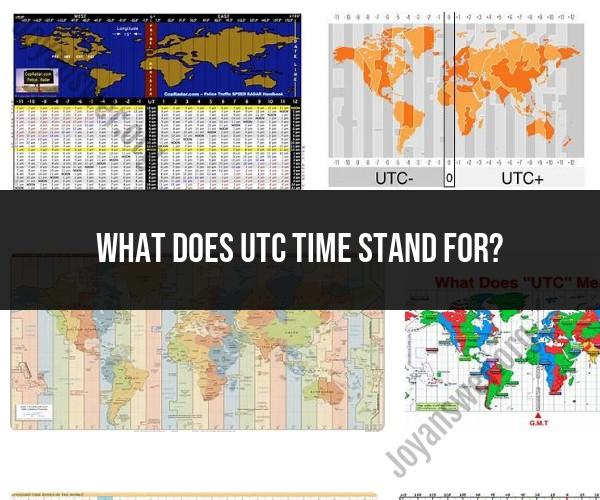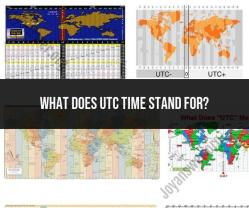What does UTC time stand for?
UTC stands for Coordinated Universal Time. It is the primary time standard used worldwide for timekeeping and scheduling events across different time zones. UTC is often referred to as "Greenwich Mean Time" (GMT), although GMT is an older time standard that is no longer considered as precise as UTC.
Here are some key points about UTC:
Coordinated Universal Time: UTC is a time scale that is kept by highly precise atomic clocks around the world. It is coordinated to account for the irregular rotation of the Earth by adding leap seconds as needed.
Time Standard: UTC serves as a reference time standard against which other time standards and local times around the world are compared and adjusted.
Zero Meridian: The prime meridian (0 degrees longitude) passes through the Royal Observatory in Greenwich, London, England. UTC is often associated with this meridian and is sometimes referred to as Greenwich Mean Time (GMT).
24-Hour Clock: UTC uses a 24-hour clock system, where the day starts at midnight (00:00:00) and ends at the next midnight (23:59:59).
Time Zones: UTC is used as the basis for calculating time zones around the world. Time zones are usually expressed as UTC plus or minus a certain number of hours. For example, Eastern Standard Time (EST) is UTC-5, meaning it is 5 hours behind UTC.
Leap Seconds: To account for variations in the Earth's rotation, leap seconds are occasionally added to or subtracted from UTC. These adjustments keep UTC in sync with the Earth's rotation.
Global Standard: UTC is used by a wide range of organizations, including aviation, telecommunications, computer networks, and international timekeeping agencies, to ensure global coordination and accuracy in timekeeping.
ISO 8601: UTC time is often represented in the ISO 8601 format, which uses a 24-hour clock and includes the date and time in the format "YYYY-MM-DDTHH:MM:SS."
UTC provides a common reference point for international communication, ensuring that people around the world can agree on the time and coordinate activities across different time zones accurately.
UTC Time Explained: Understanding Coordinated Universal Time
Coordinated Universal Time (UTC) is the primary time standard by which the world regulates clocks and time. It is within about one second of mean solar time at 0° longitude, and it is not adjusted for daylight saving time. UTC is maintained by the Bureau International des Poids et Mesures (BIPM).
UTC is used by many different industries and organizations, including:
- Aviation
- Shipping
- Finance
- Science and research
- The military
- The internet
UTC is also used to set the time on computers and smartphones around the world.
Universal Time Standards: Decoding UTC Time
UTC is a 24-hour time standard that is divided into hours, minutes, and seconds. The day begins at 00:00 UTC and ends at 23:59 UTC.
UTC is based on the atomic clock, which is the most accurate timekeeping device ever invented. Atomic clocks are so accurate that they can lose only one second every few million years.
Keeping Time Globally: The Significance of UTC
UTC is important because it allows people from all over the world to coordinate their activities. For example, if two people from different countries are working on the same project, they can use UTC to schedule meetings and deadlines.
UTC is also important for navigation. For example, pilots and ships use UTC to coordinate their positions and avoid collisions.
UTC is the primary time standard for the world, and it is used by many different industries and organizations. It is important because it allows people from all over the world to coordinate their activities and navigate effectively.


